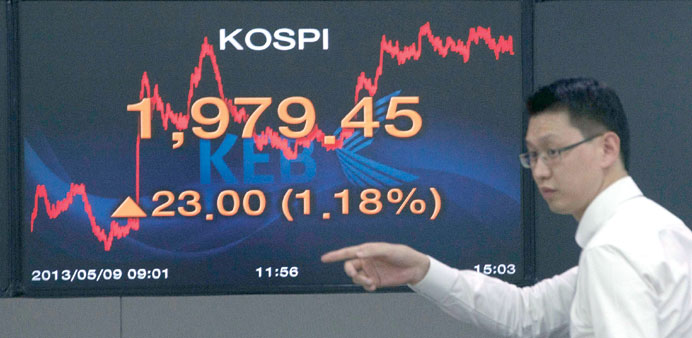|
|
South Korea’s central bank cut interest rates for the first time in seven months yesterday, in a surprise move aimed at helping to maximise the government’s stimulus efforts and ease pressure on exports from a strong won, especially against the yen.
The decision underscored concerns that Asia’s fourth-largest economy was not recovering as quickly as expected. Bond futures and stock prices rose, while the won edged lower.
The Bank of Korea had confounded market expectations last month as well, when it held rates steady, defying political pressure for a cut in response to Japan’s bold monetary easing.
This month, all but one of the seven board members voted to lower the policy rate to 2.5%, Bank of Korea Governor Kim Choong-soo said, adding recent policy easing by other central banks also influenced the board’s decision.
South Korea’s move comes at a time when Japan’s aggressive stimulus has pushed down the yen, affecting rival exporters in the region, and after central banks in Europe and Australia lowered rates and left the door open to more cuts.
The government of President Park Geun-hye, in office for less than three months, has sharply lowered this year’s economic growth forecast and introduced stimulus measures including nearly $5bn of new spending plans.
“We eased monetary policy to create a foundation on which the effects of the government’s extra budget can be maximised,” Kim told reporters, adding that the rate cut will also help address potential fluctuations in market interest rates stemming from additional bond issuance necessary for the fiscal stimulus.
Exports for the trade dependent country rose by just 0.4% in April from a year earlier while March’s industrial output contracted on monthly terms for the third consecutive month, underscoring weak growth momentum and bolstering the case for more stimulus.
Yesterday’s decision brought the 7-day policy rate to the lowest since early 2011. Only 10 out of the 26 analysts surveyed by Reuters early this week predicted a cut whereas the remaining 16 saw rates on hold. It was the fourth time in less than a year that the Bank of Korea made a surprise decision.
“This month’s rate cut means that the Bank of Korea admits that the economy is not as good as they think,” said Jun Min-kyoo, economist at Korea Investment & Securities, tipping for possibly additional rate cuts in July and September.
But analysts were divided about the central bank’s next move. Some said they did not expect further cuts in the near term as the global economy was already picking up.
Lead June futures on 3-year treasury bonds trimmed their initial gains, up 0.05 points to 107.05 by 0444 GMT. Seoul stocks were up 1.3% at 1,981.84 points whereas the won fell 0.1% to 1,087.4 per dollar.
Kim said the cumulative effects of the government’s stimulus measures and yesterday’s rate cut could lift this year’s growth by 0.2 percentage points from its forecast of 2.6%. The government is targeting 2.8% growth.
Though the central bank’s assessment of economic conditions remain unchanged, it continued to flag uncertainties surrounding the yen’s recent slide and future direction and geopolitical tensions stemming from North Korea. Aggressive monetary easing in Japan under Prime Minister Shinzo Abe has led to a rapid depreciation in the yen globally.
Though policymakers say that the yen’s fall has yet to seriously undermine South Korea’s growth, the won is up by more than 11% so far this year against its Japanese counterpart.
Kim said that sharp fluctuations in the yen’s value could be a destabilising factor, but reiterated that the exchange rate was not the key issue behind the central bank’s rate decision.

